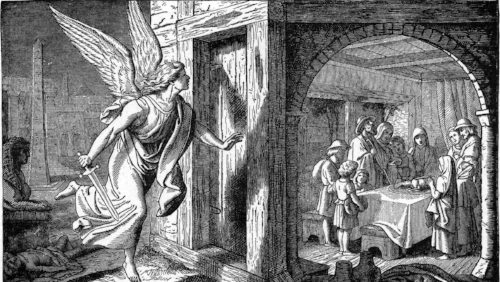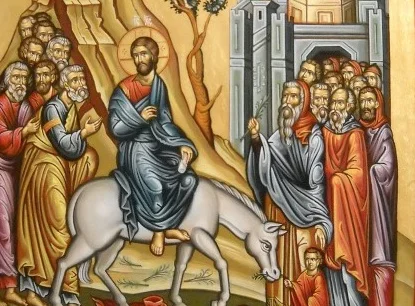We have two Canon Cards based on Numbers 5:22, so this is a two for one deal. To be honest, we made the second card because the end of the verse reads like an animated gif from a hip hop video: And all the ladies in place said, “amen, amen!” All the ladies in the place: “amen!” And all the fella in the place . . .” But the context of the passage is far less friendly: what many have called “The ordeal of the bitter water.”
In Rabbinic study, Numbers 5:11-31 is known as the sotah law, based on the Hebrew word for “straying away” (satah) from the marriage covenant. This is also a well-known passage in “seriously, F$%$# the Bible and its oppression of women!” circles, both in and outside of faith communities and the interwebs.
In summary: A husband suspects his wife has been unfaithful, but he is unable to prove it (She may or may not be pregnant, and he doubts the child is his, but that is not directly indicated in the text). So the husband brings his wife to the priest with a special offering to settle the matter.
The priest takes the offering, makes a special potion, — “the bitter water”— has the woman “stand before the Lord” with her hair down, holding the offering, while he reads a curse/oath he has written on a scroll:
If no man has lain with you, if you have not turned aside to uncleanness while under your husband’s authority, be immune to this water of bitterness that brings the curse. But if you have gone astray while under your husband’s authority, if you have defiled yourself and some man other than your husband has had intercourse with you . . . the LORD make you an execration and an oath among your people, when the LORD makes your uterus drop, your womb discharge; now may this water that brings the curse enter your bowels and make your womb discharge, your uterus drop!”
To this the woman replies: “Amen. Amen.”
The priest then dips the curse/oath scroll into “the bitter water” and gives the potion to the woman to drink. The priest then takes the offering from her hands, waves it before the Lord, brings it to the altar, and everyone waits to see what will happen to the woman.
What does happen next, if she is guilty, is up for debate, for the water is bitter not (just) in taste, but in effect: what NRSV describes as “uterus drop and your womb discharge” has been alternately described as a miscarriage (if she was pregnant), the inability conceive ever again, and/or the internal malformation of her genitalia, among other horrible outcomes. Whatever the case, this is not a death sentence: the woman does not die. We emphasize this as we’ve heard so many speak incorrectly about this: nothing in the passage says the woman is being sentenced to death. But more importantly, we want to stress the fact that the woman is drinking the “bitter water” willingly.
[What?! How can you say that?! A paranoid husband who is probably off screwing every Mariam and Martha he can find is behind all this and an oppressive, patriarchal system is backing him up!! Even if she won’t die, there are things worse than death!]
Whoa! Take a deep breath and let’s return to the passage in context.
Theology in the Iron Age is partly magical/supernatural in how the world is viewed, especially compared to our (mostly) modern sensibilities, and comprehension of science and biology. There was a real belief among the people that if you swore an oath by God, and you were lying, God would strike you dead. If you did not fulfill your oath to God, God would strike you dead. If you open, touch, or smell the Ark of the Covenant, God will strike you dead. (Okay, maybe you’re safe smelling it, but by sheol, I wouldn’t be the one to risk it) Bottom line: if you partook of a sacred, cultic rite unworthily, God would strike you dead. Period. This holds true for this ceremony as well. Why is this important?
The woman who takes “bitter water” is swearing an oath before God. She is not undergoing a “trial by ordeal” as some suggest. This is not a rehashing of the Salem Witch trials. This is a ritual wherein God is the judge, jury, and executor of punishment, if punishment is needed. Notice the emphasis there. If.
This woman has not been found guilty of adultery, otherwise she would already be dead (c.f. Leviticus 20:10, Deuteronomy 22:22). The minimum of two witnesses has not been provided by the suspecting husband (Numbers 5:13), so at this stage the woman has options. The Talmud reminds that the woman does not have to partake in this ritual, she could even choose to leave the marriage if she wished (though she could not sue for alimony/further support). Yes, her standing in the community would be diminished, and we hear the cries about how she would not be able to survive as a single woman in that society: what other choice does she have? Fine. Keep reading.
In this passage, the woman chooses to take the oath, drink the potion, and says “amen” twice: “so let it be; so let it be. Or “bring it on!” Why, because she knows she’s innocent.
She knows that the mixture (as described) is completely harmless: Holy water, Tabernacle/Temple dirt, and any ink or residue from the scroll the curse was written on. [Some claim an herb or plant was added to the mixture, the alleged poison that will harm the women, but this is nowhere in the text] She knows that this potion will do nothing to her unless acted upon by a divine hand: that this is the only commandment in the Torah which requires God, not the community, for the penalty to take place. In other words, it is all on God to harm the women, not on her husband, or the oppressive patriarchy often read into this tale.
The woman drinks the water, says “amen, amen” with the swagger and confidence of a rap gawd, a spiritual/moral boss, because she knows she stands pure before God and no harm will come to her. That she will be protected from her accusing husband by the Hand of God.
One can argue that this is a warning for women against adultery, but conversely it is more of a warning for husbands: if God does not curse the woman, who is it that lied? Will the man now have the balls to call God a liar? Will the husband attempt to cast the first stone?
We wonder if the writer of John had this in mind when he penned the words about the (famous/infamous) “woman caught in adultery” (John 8:1-11)? In that story the ante has been raised as the woman was caught in the very act of adulatory, not just standing accused without proof by a jealous husband. Regardless, as with the case with the supposed sotah of Numbers 5, it is not in the hands of the community of men to decide what will become of her, men with sins all their own: no, it is in the hand of God.
Perhaps what we have here is not another example of systemic cultural violence against woman at the hands of an antiquated, patriarchal system, and instead is an example of protection of a woman falsely accused; a woman standing on the promises of fidelity made by a God who sees her as beautifully, fearfully, wonderfully, and equally made.
But what do we know: we made this game and you probably think we’re going to Hell.



![O Come, O Come Emmanuel (Isaiah 7:14) [An Advent Card Talk]](https://images.squarespace-cdn.com/content/v1/55a9a1e3e4b069b20edab1b0/1483161046976-X5VJE3CMP9T957O72EII/3d-wallpapers-light-dark-wallpaper-35822.jpg)











Perhaps we should remember the women in the room when Ezekiel first uttered these words. They had been forcibly marched from their homes. They had watched their families die. Some had been raped by the Babylonians. How did they feel? Perhaps we should remember the women who read these texts today, the women in our churches and homes, whose current situations are not too dissimilar to the women in exile by the rivers of Babylon. They have enough reasons to weep.